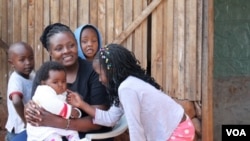One baby, many parents say, is a life-changer.
Two billion babies can change the world.
In the next 35 years, UNICEF predicts that Africa will see a massive baby boom -- so massive, that by the year 2050, four out of 10 people on this planet will be African. Between now and 2050, some 1.8 billion new Africans will be born.
Africa is already home to one of the world’s youngest populations -- the African Union says about two-thirds of the continent's 1.1 billion people are younger than 35. Within the next few decades, an unprecedented number of youngsters will reach reproductive age.
Over the last few months, VOA reporters across the continent have examined this fascinating phenomenon from multiple angles. In our stories, we asked what effect this population explosion will have on public policy, on economics, on health, on cultural traditions and more.
We found that this baby boom could potentially transform this already dynamic continent while stretching resources, challenging governments and even changing family life.
From Personal Decisions to Public Policy -- And Everything in Between
In Johannesburg, South Africa’s largest city and a magnet for immigrants from around Africa, VOA’s Anita Powell went to the front lines of this boom -- an overflowing nursery school in the city’s diverse Yeoville neighborhood.
Nursery owner Princewell Elimiaga said he doesn’t need to read the reports to know that the population is growing. His classrooms are bursting with children from around the continent, who are taught in English but speak to each other in a perplexing and delightful mix of English and isiZulu, Johannesburg’s lingua franca.
There, teacher Thembisa Madlanga, a mother of one at the age of 23, said watching the population explode before her eyes has influenced her own reproductive plans. She said she plans to stop at baby number two.
“Because of the responsibility, I don’t think I will have five, I can't manage to feed five,” she said with a laugh.
But academic researcher Koffi Kouakou of the University of the Witwatersrand said population growth is a serious public policy challenge -- and that every African leader needs to be thinking about the future, now.
“If they don’t anticipate, there will be trouble, because the growth rate of the population might exceed the consumption of the resources that we’ll need to sustain that population,” he said. “And if that population becomes bigger and bigger, you’ll need new infrastructure, about housing, new cities, new building materials, new food, water. I mean, the list goes on and on.”
It’s the Economy, Baby
Our reporters found that the continent’s wallet will be hit hard by the baby boom. We also found that African mothers, like their counterparts around the world, are bearing a greater financial burden than fathers.
In Nairobi, East Africa’s economic hub, Hilary Heuler looked at the effect of workplace policies as the population grows. She found a varied approach to parental leave -- still referred to as “maternity leave” in many nations, and still focused largely around mothers.
The International Labor Organization found in 2010 that 82 percent of the 50 African countries studied now provide at least 12 weeks of maternity leave, and that those figures have been increasing.
The ILO also found that most African nations give new fathers less than 10 days of leave -- and many give none at all.
Heuler also spoke to experts who said that while some countries are moving to extend leave, others are having a hard time enforcing the laws they already have.
Ernest Nadome, who works for Kenya’s Central Organization of Trade Unions, said denying parental leave to employees can have far-reaching social consequences.
“It has increased poverty amongst women,” he said. “I would imagine that if the employers were adhering to the labor laws and making sure they extend the necessary benefits to these ladies, it will go a long way in uplifting their living standards.”
She also talked to mothers, like Ngong resident Esther Njau, who say employers’ refusal to give Kenya's statutory three months of leave -- she says she got just two months at her private company, and many of her friends were simply fired -- have made childbearing an economic question.
“Should I? Should I not?” she said. “You’re so confused. You’re earning well, you’re living well, but the moment you get pregnant you’re fired or you’re replaced. So that’s something that can keep you from getting more kids.”
In Johannesburg, Thuso Khumalo found the opposite trend. In a nation with staggeringly high unemployment levels -- estimated at more than 25 percent -- many South African women say state-subsidized motherhood is their only means of survival.
Simpiwe Gwebu said she searched in vain for work before deciding to have her first baby two years ago. But the approximately $30 she gets per month wasn’t enough, so she decided to have another child.
“The more babies I get, the more money I get, and every year it goes up,” said Gwebu, who is 25. “There is no employment. You can’t find a job and getting a grant is much easier than going around and looking for money.”
Critics of the government grant program say it sends the wrong message, and that the government should instead focus on improving economic opportunities for the workforce -- a change that will resonate for future generations.
Birth Control
Dakar-based reporter Christin Roby tackled the often-controversial issue of birth control and found that, often, it takes a village to plan a child.
West African nations are among the continent’s most fertile -- the average woman in Niger has nearly seven children in her lifetime. Contraception is widely seen as challenging culture, religion and patriarchy.
In the predominantly Muslim nation of Senegal, Roby found that bringing religious leaders into the effort has been an important step to overcoming resistance.
“When we explained that we are not saying ‘no longer have children, but instead space out births’ for health of the mother and for the health of the child, things started to change,” said Gueye Coumba Seye, manager for social and maternity services at the Senegalese Association for Family Welfare, in French.
She said that since the campaign was launched in 2011, contraceptive use has increased among married Senegalese women. Infant mortality has dropped to about two percent.
In South Africa, Darren Taylor looked into the clash between age-old pregnancy superstitions and modern medicine.
He ventured to the home of 36-year-old Cynthia Mohape, who said she followed the superstition of keeping her pregnancy a complete secret until she was seven months along.
“If your enemies find out you are pregnant they will pay a witch to bewitch you,” she said, while nursing her healthy three-month-old son, Jeremiah. “If that happens then I will lose my baby or I will die myself.”
Beliefs like that, said Dr. Ashley Mthunzi, keep South African women away from essential pre-natal care -- and, he says, contribute to the nation’s dismal infant mortality rate. South Africa, which is the continent’s most developed nation, loses 41 babies per 1,000 live births. He also noted that the lack of pre-natal care feeds into the nation’s AIDS epidemic, as untreated HIV-positive mothers can pass the virus on to the baby.
Mthunzi, an expert in maternal health at Wits University’s Reproductive Health and HIV Institute in Johannesburg, said doctors need to convince the nation’s revered traditional healers to change their message.
“We’re not taking necessary drastic steps to bring on board these traditional healers at a scale which will actually be acceptable in curbing maternal mortality in South Africa,” he said.
Meanwhile, Mohape said she’s eager to have another child. But she plans -- yet again -- to keep it top secret.
‘Toxic Masculinity’ and the Modern African Family
Back in Johannesburg, Thuso Khumalo, himself a proud father of three, explored a growing movement to transform traditional concepts of fatherhood in largely conservative African societies.
Trevor Davies, Director of the African Fatherhood Initiative, said he is seeking to end the culture of “toxic masculinity,” in which age-old beliefs of male dominance have led fathers to be less involved parents.
Davies said fathers should be more involved in childcare, and argues that nurturing does not make a man less masculine.
“The type of society that I see us moving to, is one in which men are expected to be well behaved, strong men, who value their families and their communities,” he said. “If we start to engage men over the next few years, I think we can see less violence in communities and particularly less violence against women and children.”
Justin Kwena is the embodiment of the involved father -- he said he cherishes quality time with his 4-year-old daughter, Tumelo, and insists on contributing to housework.
“If your wife is tired, give her a helping hand. She is your helper; not your slave,” said Kwena, who is 34. “Children should know that the father is not someone who just sits on the sofa and watches TV, but he also runs around with them, gives them a bath, plays with them, talks to them, helps them with homework and things like that.”
And Anita Powell took to the streets of Africa’s most diverse city to ask: What’s your name, baby? The results are delightful, diverse and full of history, meaning and promise -- just like the continent itself.
Welcome to Africa, Baby
In the course of our work, some of our reporters also had the opportunity to spend some quality time with Africa’s next generation and their parents.
The onslaught of chubby cheeks, tiny hands and spontaneous smiles would be enough to make anyone optimistic about Africa’s future -- but experts say there is real reason to feel hopeful.
Thi Minh Ngo, an economic and social policy specialist for UNICEF based in Dakar, Senegal, said Africa’s booming population could be a boon.
“It’s an amazing opportunity,” she said. “You have this youth which is a driving force for the continent, and that is unique to Africa because the other regions of the globe are actually witnessing aging of the population.”
And Kouakou, the Johannesburg-based academic, said the continent can provide for its growing population -- as long as governments plan carefully.
“Africa doesn’t have a population problem,” he said. “What Africa might have, in fact, is a resource allocation problem. There are fertile lands everywhere, and then also the management and the governance of those resources, that’s the key.”
Reporters Hilary Heuler, Thuso Khumalo, Darren Taylor and Christin Roby contributed to this story.







